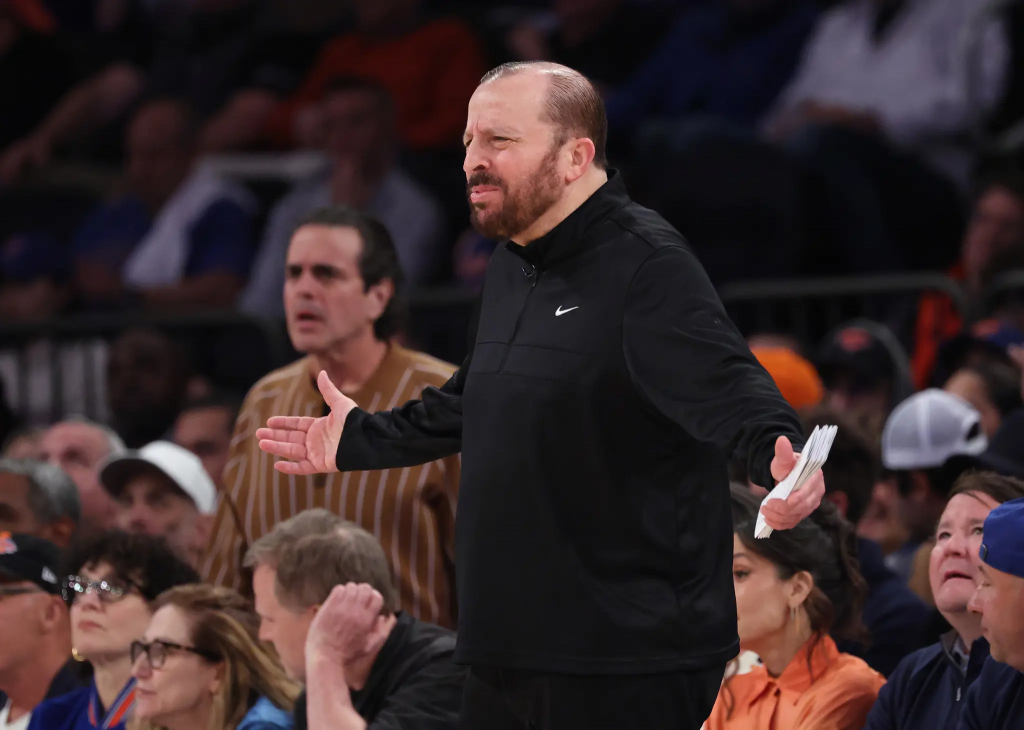The New York Knicks find themselves in familiar — and troubling — territory as their playoff struggles continue to follow a recurring script. In Game 2 against the Indiana Pacers, an all-too-familiar pattern played out once again: poor starts from the first unit, a rescue effort from the bench, and a stubborn rotation choice from head coach Tom Thibodeau. As frustration mounts and margins shrink in the postseason, the Knicks’ inability to fix a glaring lineup issue may be their undoing.
A slow start that feels like a rerun
If you’ve watched the Knicks this postseason, you’ve likely predicted the beginning of Game 2 down to the minute. Another sluggish opening from the starting five quickly put New York in a hole, falling behind 19–11 early. It wasn’t just bad luck — it was emblematic of a deeper problem. Mikal Bridges, one of the more candid voices in the locker room, didn’t sugarcoat it after the game: “Maybe we’re playing a little too soft in the beginning of halves.”
Soft. The word lingered in the postgame air, and not without reason. The starters — Jalen Brunson, Bridges, OG Anunoby, Josh Hart, and Karl-Anthony Towns — once again failed to set the tone, surrendering energy and momentum from the opening tip. The metrics are damning: the Knicks’ starting five has a combined minus-81 plus-minus in this postseason alone. In the current series against the Pacers, they’re already minus-29.

The bench to the rescue — again
As has become routine, it took the introduction of Mitchell Robinson and Miles McBride to revive the Knicks’ tempo and spirit. The team immediately ripped off a 15–5 run to close the first quarter, erasing an eight-point deficit and taking a slim two-point lead. The contrast was stark — where the starters were passive and disconnected, the bench was aggressive and cohesive.
Robinson’s energy on the glass and McBride’s perimeter pressure sparked both ends of the floor. The momentum shift was no coincidence; it was a statement. The same bench players had flipped the script in Game 1, and they were doing it again. And yet, that surge wasn’t enough to shift the pattern in Thibodeau’s mind.
A coach unwilling to budge
Despite the evidence on the court and the numbers on the stat sheet, Thibodeau remained loyal to his starting five. At the start of the third quarter, with the Knicks holding a three-point lead, the starters returned — and immediately gave that lead away. By the time Robinson checked back in with 4:18 left in the third, the Knicks were down by three.

Thibodeau’s rigid substitution pattern has long been a point of debate among fans and analysts. But in the postseason, where each possession carries amplified weight, the cost of stubbornness can be fatal. This isn’t just a game-to-game issue anymore — it’s becoming an identity crisis for a team that’s built on toughness but begins games passively.
A broken formula
This isn’t a one-game anomaly. The Knicks’ struggles with their current starting unit have persisted throughout the playoffs, and the trend shows no signs of reversing. Every advanced stat points in the same direction: the starters are consistently outplayed. In both Game 1 and Game 2, they were on the floor during critical collapses — including the disastrous fourth-quarter meltdown that opened the series.
Karl-Anthony Towns, brought in to stretch the floor and add scoring punch, has yet to find chemistry with the unit. OG Anunoby’s elite defense hasn’t been enough to offset the sluggish starts. And while Brunson continues to provide brilliance in spurts, he can’t compensate for five-player lapses. “Collectively, we gotta get it together,” Brunson said postgame. It was a diplomatic response, but one that hinted at deeper frustration. The starting five isn’t just underperforming — they’re dragging the team down.
Rewriting the rotation narrative
Part of the issue may trace back to Thibodeau’s original vision. Throughout the regular season, he frequently mentioned that the Knicks were operating “without our starting center,” a reference to Mitchell Robinson’s long absence. By most accounts, the plan was to pair Towns and Robinson together in the starting frontcourt, with Hart coming off the bench.
That vision never materialized. Whether due to injuries, conditioning, or chemistry, the pieces haven’t aligned. And now, with postseason urgency climbing, there’s no room left for theoretical rotations. What’s happening on the court must take precedence — and what’s happening is clear: the Knicks’ bench is bailing them out, while the starters keep digging the hole.
A crossroads moment
With the series still within reach, the Knicks face a critical decision. Will Thibodeau adapt, reshuffling his rotation to prioritize effectiveness over loyalty? Or will he double down on a starting unit that has yet to prove it belongs on the floor together in crunch time?
The clock is ticking, and the next game might be the tipping point. In the unforgiving landscape of playoff basketball, “soft starts” and “stubborn systems” are not just phrases — they’re season-enders. And for a team built to battle, the last thing the Knicks can afford is to be predictable.





